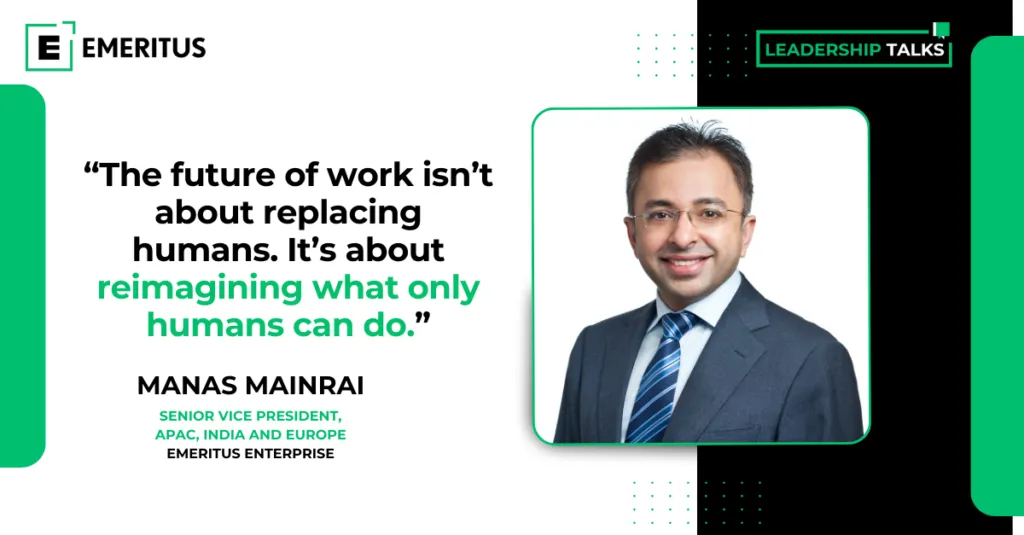Rethinking Human Relevance in the Age of AI

- How AI Governance and Ethics Shape the Future of Human Leadership
- How AI Is Changing the Nature of Work
- What can’t AI do yet that human leaders must address?
- Why is AI governance essential for ethical AI adoption?
- Connecting the Dots: Upskilling for an AI-Driven Future
- Accelerate AI Capability with Emeritus
Synopsis:
Manas Mainrai, SVP at Emeritus Enterprise, shares his perspective on how AI governance and ethics will shape the future of human leadership, emphasizing responsible adoption, continual upskilling, and human-centred capabilities as the key to lasting business impact.
How AI Governance and Ethics Shape the Future of Human Leadership
AI is no longer a futuristic concept—it’s here, evolving rapidly and transforming how businesses operate across industries. Yet amidst the excitement, one fundamental question grows louder: What happens to human leadership when AI becomes more capable than ever before?
These are the kinds of questions leaders should be asking, says Manas Mainrai, Senior Vice President for APAC, India, and Europe at Emeritus Enterprise. With nearly two decades of leadership, sales, and consulting experience, Manas has been instrumental in scaling Emeritus’s enterprise operations, drawing on deep regional knowledge and strategic insight. Having witnessed the implementation of AI solutions across Emeritus’s clients, Manas shares his perspective on how leaders must go beyond understanding AI’s capabilities to actively shape its governance and ethics—ensuring technology serves people, not the other way around.
Presently, leaders face an uncertain future where the boundaries between human potential and machine capabilities are constantly shifting. This demands human-centered AI leadership, continual upskilling, and a proactive mindset about the future of work.
How AI Is Changing the Nature of Work
The transformation AI brings can be viewed across three-time horizons:
- Short term: Rapid displacement of repetitive, rule-based jobs such as data entry clerks, customer service agents, and telemarketers. While unsettling, this is part of an ongoing cycle we’ve seen before with roles like video rental associates and switchboard operators. Each wave of disruption has brought opportunities for repurposing human potential. The current shift, however, is broader and faster, affecting industries and roles across every level.
- Medium term: The pace of human learning must keep up with machine acceleration. While becoming a surgeon may take over a decade, becoming a prompt engineer today can take just a few months. The skills of the future can be acquired faster, and organizations must support this reskilling effort. Businesses will need to build adaptive learning systems and partner with education providers who understand both the technological and human sides of transformation.
- Long term: The more existential challenge—what happens when machines can do nearly everything better? Will we face the creation of a “useless class” as Yuval Harari suggests, or can we reframe human value around imagination, ethics, and decision-making? What if the most valuable work in the future isn’t about execution but about creating meaning, direction, and human connection? This points to a future where our advantage lies in nurturing capabilities that algorithms can’t replicate—curiosity, moral judgment, and genuine empathy.
“Human imagination is still our greatest differentiator. AI cannot invent gravity, but humans imagined it into existence.”
– Manas Mainrai

What can’t AI do yet that human leaders must address?
AI excels at recognizing patterns, but it lacks
- Contextual judgment
- Emotional intelligence
- Moral reasoning
- Imaginative capacity
For instance, ask an AI to create an analogue clown-themed watch showing 8:30, and you will likely get one showing 10:10—because most watch ads use that display. This is automation bias: the inability to think beyond learned patterns.
Similarly, AI cannot judge credibility. This underscores the need for human oversight. We’ve already seen this play out in scenarios where AI tools have amplified biased data or delivered confident but incorrect results. Left unchecked, these limitations can have real-world consequences, impacting hiring decisions, financial outcomes, and public trust.
That’s why empathy, ethical reasoning, and imagination—deeply human traits—remain irreplaceable. These are also the leadership capabilities we must foster to complement AI. The future workforce will need a balance of digital fluency and human-centered thinking. Organizations must start embedding these capabilities today—through cross-functional training, values-led leadership, and by creating space for experimentation and reflection.
Why is AI governance essential for ethical AI adoption?
As AI grows in power, it becomes less transparent. Governance is essential to:
- Clarify accountability in machine-led decisions
- Ensure fairness, privacy, and ethical deployment
- Create trust within teams and with external stakeholders
AI governance and ethics matter because AI still cannot make context-based decisions, apply emotional intelligence, or demonstrate moral reasoning. They’re the qualities that keep AI aligned with human values.
Organizations that embed strong governance frameworks early will differentiate themselves—not just through compliance, but through culture. This is especially important in sectors like healthcare, finance, and education, where decisions impact real lives and long-term equity. Responsible AI governance includes not just audit trails and data security, but also inclusive design, algorithmic transparency, and continuous feedback loops.
Good governance is not just a technical necessity but a leadership mandate. It signals a commitment to values, to stakeholders, and to society at large. Embedding governance early into AI strategies gives organizations a competitive edge—not just in managing risk, but in building a culture that values ethical decision-making. This trust will become a core differentiator, separating those who merely deploy AI from those who inspire lasting confidence through its use.
Connecting the Dots: Upskilling for an AI-Driven Future
At Emeritus, we work closely with organizations to build learning journeys tailored to their context, leadership culture, and digital maturity. As AI capabilities evolve, so must learning architectures. It’s no longer just about technical knowledge but about equipping teams to make decisions with AI, communicate its impact, and collaborate across functions.
Our programs span foundational awareness to advanced implementation, aligned with what leaders and teams need at each level of maturity. We’ve partnered with enterprises globally to roll out academies focused on:
- Building AI fluency across business functions
- Training teams to work with AI tools in everyday decision-making
- Developing leadership capabilities in AI governance and ethics
This layered approach helps organizations embed AI capability sustainably across the workforce. The emphasis is not just on skill acquisition but on mindset shifts. Teams must learn to see AI not as a replacement, but as a co-pilot—something that enhances judgment, accelerates processes, and expands possibilities. When this shift happens, organizations are better equipped to innovate, respond to change, and scale new business models.

Accelerate AI Capability with Emeritus
“AI is not about replacing people; it’s about evolving how we work. As leaders, our role is to guide that evolution thoughtfully.”
– Manas Mainrai
Building enterprise-wide AI fluency requires more than technical awareness—it calls for leaders and teams who can confidently apply AI in business contexts, make informed decisions, and drive innovation responsibly.
Emeritus partners with leading universities and enterprise clients to design contextual, high-impact learning journeys that bridge strategy and skill. Through tailored in-house programs, we help organizations embed AI capability at every level—ensuring their workforce is not only future-ready but future-confident.
If you’re looking to upskill your teams in AI, build organizational capability, or design custom learning journeys that drive impact, get in touch with the Emeritus Enterprise team to learn more.


